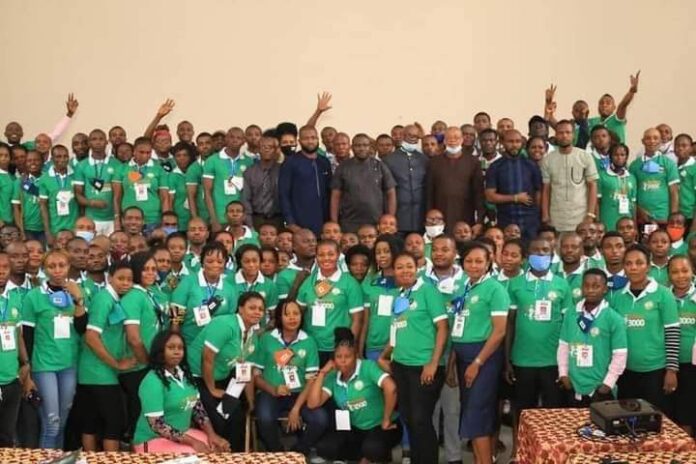Participants at the workshop.
By Ukpong Ukpong
The Managing Director and Chief Executive Officer of Bennycom Agro and Farms Nigeria Limited, Mr. Brezhnev Langwa, has stated that if youths seize opportunities offered by government in food production then Akwa Ibom State would be able to feed itself and the country.
Langwa, made this known while delivering a lecture titled “Fundamentals of Vegetable farming and its utilization as tool for wealth creation and employment” at a 3-day intensive vegetable enterprise training program organized by the Ministry of Trade and Industry, Akwa Ibom State in partnership with Bennycom Agro and Farms at the Conference Hall, Watbridge Hotel and Suites, Uyo, recently.
The training, which drew 250 youths from the 31 Local Government Areas, is part of the Ibom3000 project, which is meant to improve capacities of youth in the State in diverse vocational, technical, entrepreneurial and managerial skills in Oil and Gas, Agribusiness, ICT and SMEs to enable them secure gainful employment.
READ : FCMB introduces paperless, cardless transactions at branches, ATMs, POS terminals
The finance guru and consultant to State government on the training programme, thanked Governor Udom Emmanuel for his visionary leadership and pragmatic efforts to build an army of entrepreneurs and employable youths in the State.

He commended the Commissioner for Trade and Industry, Barrister Prince Akpabio, for interpreting correctly the vision of the governor as it concerns entrepreneurship and industrialization.
Langwa noted that the location of Akwa Ibom State in the rainforest region is a blessing, considering all the vital fundamentals this provides which makes the State capable of farming all year round.
“From experience I have gathered over the years cultivating vegetables in this State, I can say authoritatively that all the fundamentals of vegetable production are available in relatively good condition here, including the soil, water, topography, weather and all others. We can plant all year round unlike some parts of the country whose crop production is regulated by rainfall.
“There is a huge potential for vegetable production here. We can grow vegetables every season and enough to feed our people, contribute to food security in Nigeria and export to neighbouring countries. However, the challenge is to get young men and women to change their mind from wasting their energy and time running after politics; they must accept to engage productively in farms”.
He averred that there is need to jettison old and unproductive techniques of farming and adopt new techniques and inputs which have proven potent in improving yield, recalling that six years ago it was difficult to introduce several inputs now commonly used in vegetable production in the State.
“About six years ago, when we introduced hybrid cucumber to Akwa Ibom market, it was rejected. We took 30 bags to the market and was able to sell only seven bags, but today that same cucumber is a premium.”
The investment expert urged trainees to seize opportunities offered them to lift themselves out of the labour market into employers of labour, contributing to economic growth in the State.
“Governor Udom Emmanuel has invested so much to lift youths out of joblessness into productive enterprises. Don’t wait for manna to fall, seize this opportunity and turn around your fortune. You are responsible for what you do with the knowledge and resources made available to you at this training workshop.
Emphasizing the expediency of local food production, he disclosed that “in Cameroun, a farmer will take 30 bags of pepper to the market. He may sell 20 and 10 may get rotten; he will then dry it and export to Nigeria as ‘cameroun pepper’. We should rather plant our own pepper here and eat fresh than go to the market to buy rotten, dried ‘cameroun pepper’.
He revealed that one of his companies, Benny Fruits and Vegetables is already considering planting certain vegetables in the state mainly for export to neighbouring countries.
“We are working on exporting these vegetables and earning money to boost Akwa Ibom economy. Instead of causing capital flight by buying imported vegetables we are instead exporting them and bringing money to the State.
Similarly, the second resource person, Silver Brownson Udoaka, a Consultant on Green House with Diezengoff – Lagos, who spoke on “Greenhouse Farming: The Success Story”, observed that “the State is blessed with fertile and well drained soil which supports growth of wide variety of vegetables. Although, these vegetables can thrive here, the menace pose by pests affects yield which is why green house vegetable production is highly recommended”.
READ ALSO : Governor Sule sues for unity of purpose among journalists
According to her, although the intial cost seen prohibitive but on the long run is it cost effective. She added that using green house will double the yield of vegetables, prevent insect attacks, reduce cost of crop management and pest control, drastically reduce manpower as well as cost of labour.
She encouraged youths to do more than just attend the training by taking the opportunity to own farms, saying “you can’t eat any food without at least a vegetable like pepper so why not cultivate it and earn money from it.”
 Advertisement.
Advertisement.
On the success of green house in curbing loss of yield, she noted that “green house will guarantee between 80 – 90% yield, it will improve the quality of vegetables and check pests from invading the farm. After this lecture, if you’re presented with a VENZA Toyota suv and a green house, you should choose the later because farming with a green house will produce two of this vehicle within a year”.
Other modules covered by the training include “Crop protection products in farming what edge does it offer?”, by Ahmed Bello, Fields Solution Manager, Bayer, Lagos; “Disease and Pest Control: The use of potent fungicides, insecticides and other agrochemicals” by Adeleke Adewumi, Consulting Agronomist, Abuja!; “Opportunities for fresh vegetables in Nigerian and overseas markets” by Apollos Simon, Benny Agro Inputs, Jos as well as “How can Akwa Ibom state become the hub for fresh vegetable in the South South Region?” by Mr. Uwem Udoh via Zoom.
















